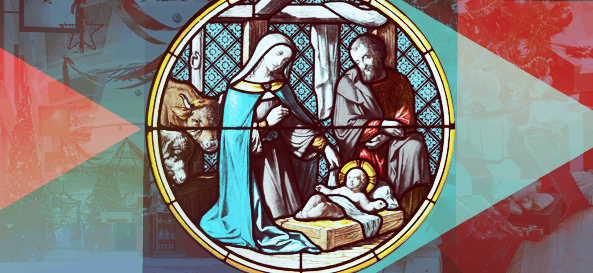
For a lot of people, Christmas is not always the “most wonderful time of the year.” Between visiting family, buying presents, sending out Christmas cards and everything else, what is supposed to be a special time can turn into a hectic and stressful few weeks.
But the tradition of advent calls Christians to slow down and think more about what the season truly means.
That’s what Louie Giglio’s new book, Waiting Here for You: An Advent Journey of Hope is all about. We talked to the author, speaker and Passion City Church pastor about the book, the meaning of Advent and how it can impact us year-round.
Why did you decide to write a book on Advent?
I grew up in a tradition where we really didn’t observe the advent season. Later in life, I’ve gotten in touch with what advent is all about. Advent is a season of expectation beginning four Sundays out from Christmas to prepare our hearts to celebrate and remember the faithfulness of God.
When we planted Passion City Church, I really wanted our church to be able to dodge the rush of the Christmas season, so we started celebrating the weeks of Advent. We began writing daily emails to all the people in our church with Scripture and encouragement and a little point of worship and prayer. And our church loved it. So we did it again the next year and the next year, and it sort of evolved and morphed into a really substantial resource for our church. That’s where Waiting Here for You came from.
In the church world, Christmas season is not a downtime, it’s a really busy time. And for the normal person, it’s 50/50 of people who are really looking forward to it and people who are really dreading it. This resource is for the people who are finding some headwind going into Christmas, and maybe life hasn’t turned out the way they hoped it would.
What do you think is lost when we as the American church have stop observing Advent, and what do you think is gained by bringing it back?
We are living in an opportunistic culture. The calendar starts merging into sales peaks. Black Friday has completely engulfed Thanksgiving. If you don’t take a more aggressive and offensive stance, you’re going to be swallowed up by the deluge of what the culture is purporting.
You go onto any financial website, all you’re hearing right now are the predictions for the spending of this year’s holiday season. We’re living in a culture that’s all about opportunism, and it ends up steamrolling the calendars. All the sudden, Thanksgiving and Christmas become a blur of craziness.
Then we’re finally left, barely standing, holding a candle at church on Christmas Eve going, “Oh yeah, it really was all about the night when Christ was born.”
When we recover Advent, we turn down the volume on the culture and we turn up the volume on the Spirit of God. We let that voice guide us and remind us that this season is about a promise that God is going to do what God has promised He is going to do. And He’s going to do that for every single one of us who has put our hope in Him.
Do you have any advice for people who see the danger of succumbing to materialism, but want to celebrate? Is there a good way to mix that balance of delight and expectation and just the urgency of the season?
In Waiting Here for You, there are four sections for the four weeks leading up to Christmas. The message is simply stop and remember that Jesus said it’s better to give than receive.
It really is about giving gifts, because life’s about giving. We’re beneficiaries of so much of the richness of God in our lives. It’s now our privilege to be able to be the exporters of what God has given to us and to the world.
I think Christmas is a great season to give, but it’s about giving out of what God has given us. And material gifts are a tangible way of telling people that we love them. Giving the right gift to someone can really value them. Even that is a picture of Jesus in the world. But if we lose sight of what Christ has given us and our ability to reflect that to the people around us, then we completely lose the meaning of Christmas altogether.
What do you say to someone who’s maybe a little cynical, a little burned out, and is just not looking forward to Christmas anymore?
I’d say that’s an absolutely fair place to be. And if God is real, and I believe He is, then God can redeem anything, including a season.
If you feel cynical and burned out, let the burnout happen, because burnout leaves nothing of us. God isn’t afraid of burnout. I think that’s where grace is at its best. Say to God, “I’m done. I’m checking out on Christmas.” Then pray, “So that’s me, but what about You, God? Can You rekindle in my heart the real wonder that Jesus Christ, the Son of God, cried the cry that broke 400 years of silence between the promise of God in Malachi and the first words in Matthew? Because I need that.” I believe that’s where God loves to step in and do what only God can do.
Where do you see this need for living in expectation and hope transcending the idea of Christmas and being something we just need to incorporate as a Body of believers in America?
I go back to this idea that we’re all living in-between pain and promise. For believers in Jesus, He said there’s going to be a new heaven and a new earth. There’s going to be a kind of earth, just better, perfect. No more sorrow, no more sickness, no more pain, no more death, no more tears, no more devil, no more deception, no more decay. In a macro way, we’re all stuck between the pain of reality in this broken world and the promise of Jesus in a world to come.
And then you take that down to the micro, where people are waiting on a spouse or a couple’s waiting on a baby or somebody’s waiting for a breakthrough of some kind in their life. In that moment, there’s that same tension of saying “God, I believe You, and I believe You’re here with me.” We’re not just waiting on God, we’re waiting with God.
We have a God who’s willing to get in the middle of the mess and the chaos with us and whose presence with us is a game-changer. I think that’s the message of advent that lasts every season of the year.























